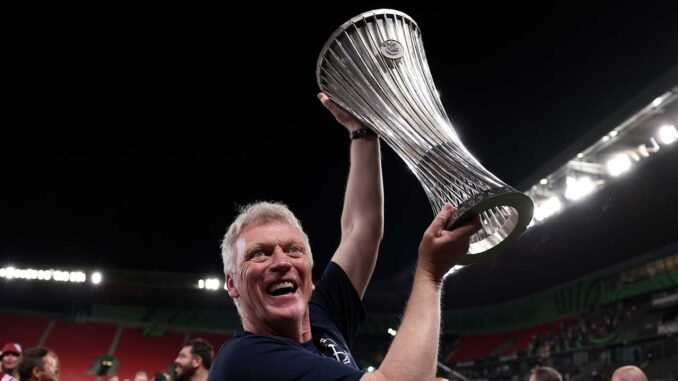
The name David Moyes is well-known to football fans across the UK and beyond. With years of experience managing top-tier clubs, Moyes has become a seasoned manager, often praised for his tactical discipline and ability to get the best out of his players, even with limited resources. Recently, his name has been floated as a potential candidate to take over the managerial reins at Celtic Football Club, one of Scotland’s most prestigious clubs.
As Celtic looks to bounce back from the departure of Ange Postecoglou to Tottenham Hotspur, Moyes’ candidacy has generated significant buzz. Could the former West Ham United manager be the man to lead the Hoops into a new era?
David Moyes has had a career marked by both highs and lows, yet his reputation as a resilient and capable manager remains intact. Starting his managerial journey with Preston North End, Moyes quickly gained a reputation for his ability to develop talent and organize teams. However, it was his long stint at Everton that truly put him on the map. For over a decade, Moyes was the architect of Everton’s success, consistently competing in the Premier League’s upper half despite operating on a smaller budget than most of their rivals.
In 2013, Moyes was tasked with succeeding Sir Alex Ferguson at Manchester United, a role that was always going to be a challenging one. His time at Old Trafford was short-lived, and he faced heavy criticism after failing to replicate Ferguson’s success. Despite this setback, Moyes bounced back and, in recent years, has shown his managerial mettle once again at West Ham United. Under his leadership, West Ham achieved European qualification, reached the semifinals of the Europa League, and solidified their place in the Premier League’s top half. These accomplishments have reestablished Moyes’ standing as one of the Premier League’s more experienced and capable managers.
Celtic Football Club is currently in a period of transition. After the departure of Ange Postecoglou, who led the club to multiple domestic titles and a strong showing in European competitions, the club is looking for a manager who can build on that success and elevate the team to new heights. Postecoglou’s style of play was exciting and forward-thinking, with an emphasis on high pressing and possession-based football. Finding a manager who can continue this philosophy while strengthening the squad and maintaining Celtic’s dominance in Scottish football is no easy task.
Moyes, with his vast experience in English football and European competition, fits the profile of a manager capable of handling Celtic’s ambitions. His understanding of how to compete at the highest level in Europe—gained through his time in the Premier League and his Europa League success with West Ham—makes him a strong candidate for the role. Furthermore, Moyes’ pragmatic approach to managing teams is something that could bring much-needed stability to Celtic’s dressing room.
One of Moyes’ key strengths is his ability to work with the resources at his disposal and get the best out of his players. At clubs like Everton and West Ham, Moyes has proven that he can build competitive teams without spending lavishly on transfers. This could be especially beneficial for Celtic, a club with a solid foundation but operating on a budget that is not comparable to many of Europe’s elite clubs. Moyes’ ability to scout talent, develop young players, and build a team that works cohesively could be a huge asset to Celtic as they look to compete both domestically and in European competitions.
Tactically, Moyes is known for his organized approach, with an emphasis on defensive solidity and a structured team shape. His teams often play a disciplined brand of football, which could provide the stability needed for Celtic to regain control of their domestic league and make an impact in European tournaments. While he may not have the attacking flair of Postecoglou’s system, Moyes’ pragmatism could be just what the Hoops need to balance their offensive play with a more robust defense.
Moreover, Moyes’ experience in managing high-pressure situations—something he experienced during his tenure at Manchester United and his successful return to West Ham—will serve him well at Celtic. The expectations at Celtic Park are always high, and managing a club with such passionate supporters requires a manager who can handle intense scrutiny and pressure. Moyes has proven time and again that he can rise to these challenges, and his calm demeanor under pressure could make him a steadying influence on the team.
Despite his successes, managing Celtic would come with its own set of challenges. Scottish football, while competitive, is often seen as a different proposition to the Premier League, with different dynamics both on and off the pitch. Adapting to the unique atmosphere at Celtic Park, where fan expectations are immense, would require Moyes to quickly acclimatize to the club’s culture.
Additionally, Celtic’s primary focus is not just to dominate domestically but also to make a serious impact in European competitions, something Moyes has struggled with in the past. His previous forays into the Champions League and Europa League have had mixed results, and he would need to prove that he can succeed on the European stage with Celtic.
David Moyes represents a steady and experienced option for Celtic, a club that is looking to build on the foundations left by Ange Postecoglou while seeking a manager who can bring stability, discipline, and European experience to the team. Although he may not be as flashy as some other candidates, Moyes’ pragmatic approach and ability to manage expectations could be exactly what Celtic needs as they look to restore their dominance in both Scottish and European football. If Moyes is appointed, it could mark the beginning of an exciting new era for Celtic FC.
Leave a Reply